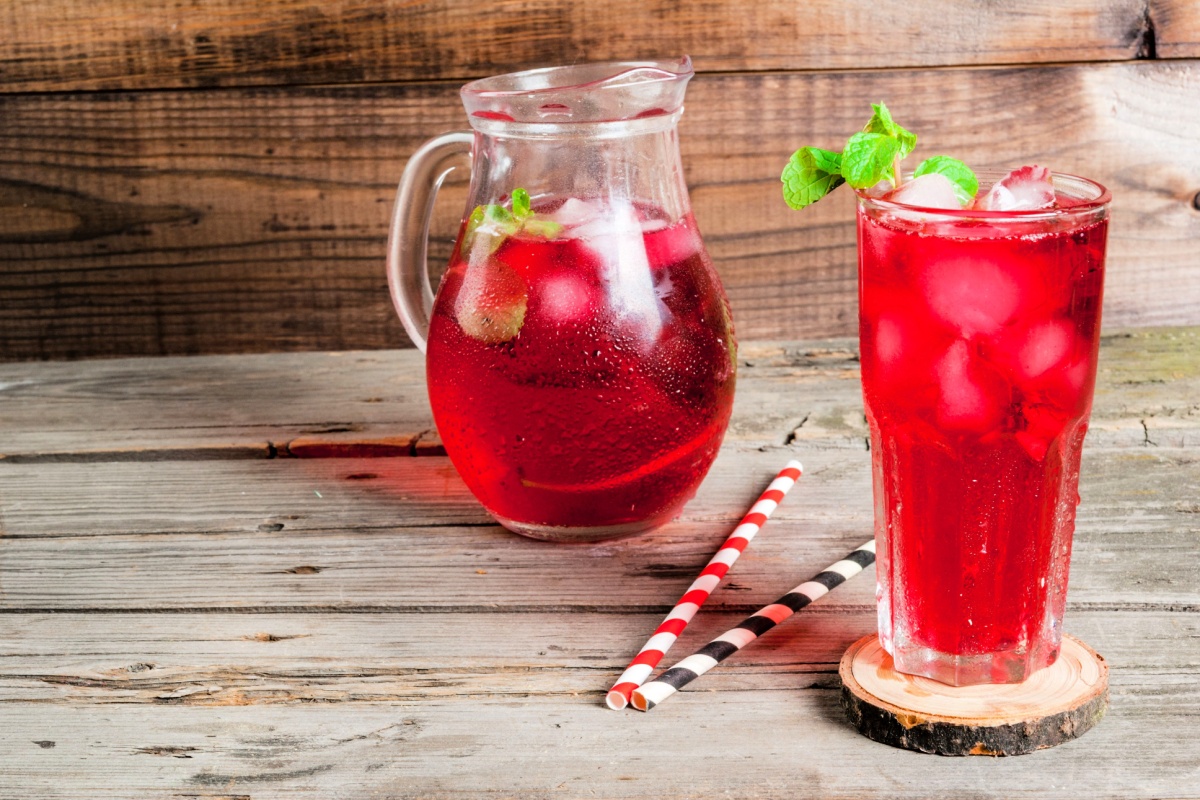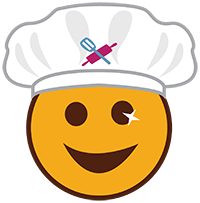Sweet "Zobo" Hibiscus Quencher

Sweet "Zobo" Hibiscus Quencher
This drink is a choose-your-own-adventure concoction served cold over ice! You’ll mix tart hibiscus tea with the fruit juice of your choice. Traditionalists might choose pineapple juice, but orange or apple is equally delicious. Whatever you choose, you’ll end up with a beautiful ruby-red beverage, thanks to the hibiscus!
Happy & Healthy Cooking,
Fun-Da-Mentals Kitchen Skills
- measure :
to calculate the specific amount of an ingredient required using a measuring tool (like measuring cups or spoons).
- steep :
to soak a food, like tea, in water or other liquid so as to bring out its flavor.
Equipment Checklist
- Pitcher
- Liquid measuring cup
- Wooden spoon
Ingredients
Sweet "Zobo" Hibiscus Quencher
- 3 C water
- 1 C pineapple, orange, or apple juice
- 2 hibiscus tea bags
- ice, optional
Instructions
Sweet "Zobo" Hibiscus Quencher
measure + steep
Measure 3 cups water and 1 cup fruit juice (of your choice) into a pitcher and stir. Then, add 2 hibiscus tea bags. Steep for 10 to 15 minutes.
remove + pour
Remove the tea bags and discard. Then, stir, pour the drink over ice, and enjoy!

Hi! I'm Hibiscus Tea!
"I'm a pretty, dark red color, and I'm sweet, floral, and a bit tart, similar to cranberry juice. You can serve me as a hot tea or a cold, fruity punch!"
- Hibiscus tea is made from an infusion of the calyces of the hibiscus (roselle) flower. A calyx protects and supports a flower bud. The herbal tea can be made from fresh or dried hibiscus.
- The hibiscus used to make tea is thought to have come from Africa. Hibiscus tea is popular all over Africa. In Sudan, hibiscus tea is used in folk medicine to treat health conditions.
- Roselle juice is a dark red-purple juice made from hibiscus. It is called "bissap" in Senegal and "sobolo" in Ghana. In Caribbean countries like Jamaica, the juice and the flower are called "sorrel." In Southeast Asia, hibiscus tea is heavily sweetened and served as a cold beverage.
- Hibiscus tea is known to moderately lower blood pressure in people with high blood pressure. It may also help lower cholesterol and fight inflammation.
What is "Zobo"?

- "Zobo" is a tart and tangy Nigerian drink made of dried hibiscus petals, water, honey, and spices, like cardamom, cinnamon, cloves, ginger, nutmeg, and peppercorns. Fruit juice may also be added. The drink can be served hot or cold.
- Zobo originated with the Hausa people of northern Nigeria. It is the predecessor to "sorrel," a Jamaican hibiscus drink, and "agua de Jamaica," hibiscus tea from Mexico.
- Zobo and other hibiscus drinks have antibacterial properties. They contain antioxidants, like anthocyanins, vitamins C, and polyphenols, which can help reduce the risk of some cancers. Some studies show they can help lower blood pressure and may help improve liver health.
Let's Learn About Nigeria!

- Nigeria is a West African country officially called the Federal Republic of Nigeria. It is made up of 36 states and the Federal Capital Territory, the location of the capital city, Abuja. The largest city is Lagos.
- The total area of Nigeria is 356,669 square miles. That is bigger than the US state of Texas but smaller than Alaska.
- Nigeria has the most people of any country in Africa, with over 225 million people. The population is very diverse, with more than 250 ethnic groups. However, the largest groups are the Hausa, the Yoruba, and the Igbo. They make up about 60 percent of the population.
- The Nigerian government is a Federal Presidential Republic with a President, Vice President, National Assembly (legislature), and Supreme Court.
- Nigerian Independence Day is October 1, the biggest festival in Nigeria, when they celebrate Nigeria's independence from Great Britain in 1960. They had been a British colony since 1850, which explains why the country's official language is English. Their national languages are Hausa, Yoruba, and Igbo.
- The climate in Nigeria is usually hot—Nigeria averages around 90 degrees most of the year, and there are only two seasons: rainy and dry!
- Zuma Rock is a natural monolith (a single massive stone or rock) that is 980 feet higher than its surrounding area. It is the highest point in Nigeria at 2,379 feet in elevation and is a 45-minute drive from Abuja, the capital. A picture of Zuma Rock appears on the 100 note of Nigeria's currency, the "naira." It is known not only for its size but for the face that appears on one of its sides.
- The Sclater's guenon is a rare monkey that calls southern Nigeria home, living in swamps and forests. The African (or West African) manatee weighs about 1,000 pounds and lives in Nigeria and other parts of West Africa.
- The hundreds of ethnic groups in Nigeria contribute to the country's cuisine. Their dishes include "akara" (a fried bean fritter), "dodo" (fried ripe plantains), "jollof rice" (a one-pot dish of rice, tomato, onion, and meat or fish), "moin moin" (a savory bean pudding with onions, peppers, and black-eyed peas), and "suya," (skewered, smoked, and spicy sliced meat).
What's It Like to Be a Kid in Nigeria?
- The school year in Nigeria runs from January through December. Typically, there are three semesters, with a month off following each one. Since English is the national language in Nigeria, it is spoken in schools.
- Most schools have strict dress codes. There are required uniforms and rules about everything from hairstyles to shoes to jewelry. This can be difficult for kids because Nigerians are known for wearing colorful traditional outfits.
- Many Nigerian extended families live in the same home or separate homes clustered very close together.
- Age equals respect in Nigerian families. For example, an older sibling may be called "Senior Brother" or "Senior Sister" instead of by their actual name.
- "Ayo" is a fun board game found everywhere. You use seeds, pebbles, or dried beans and twelve cups to play. Checkers and hand-clapping games are also popular.
- Soccer is a national obsession in Nigeria (like in much of Africa). Kids also enjoy volleyball and wrestling.
- For snacks, kids may eat "puff puff," Nigerian doughnut balls, or "chin chin," crunchy fried pastry, like cookies.




